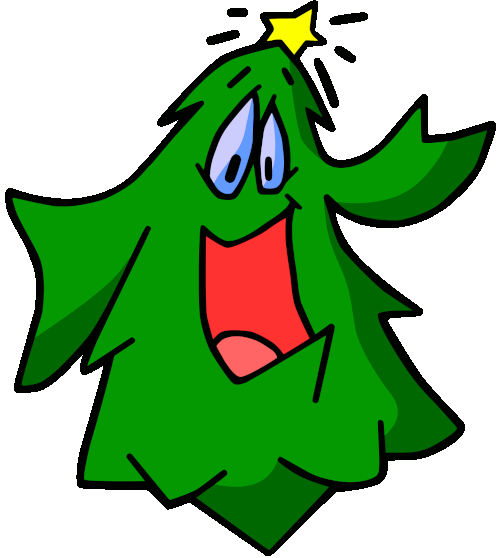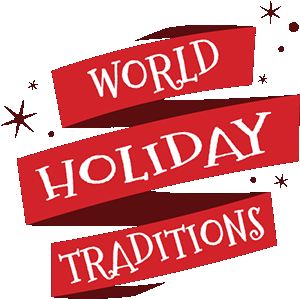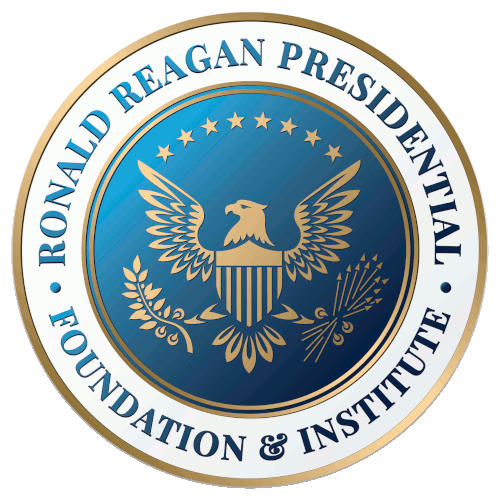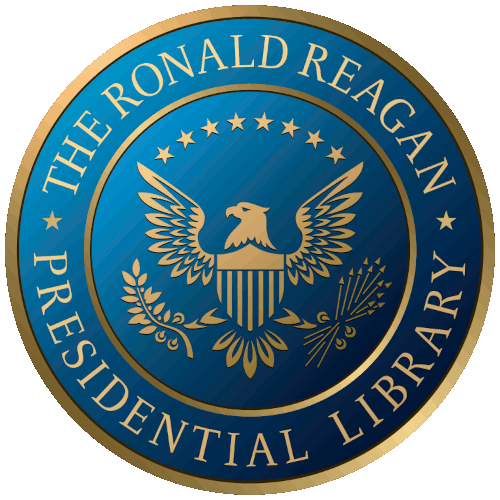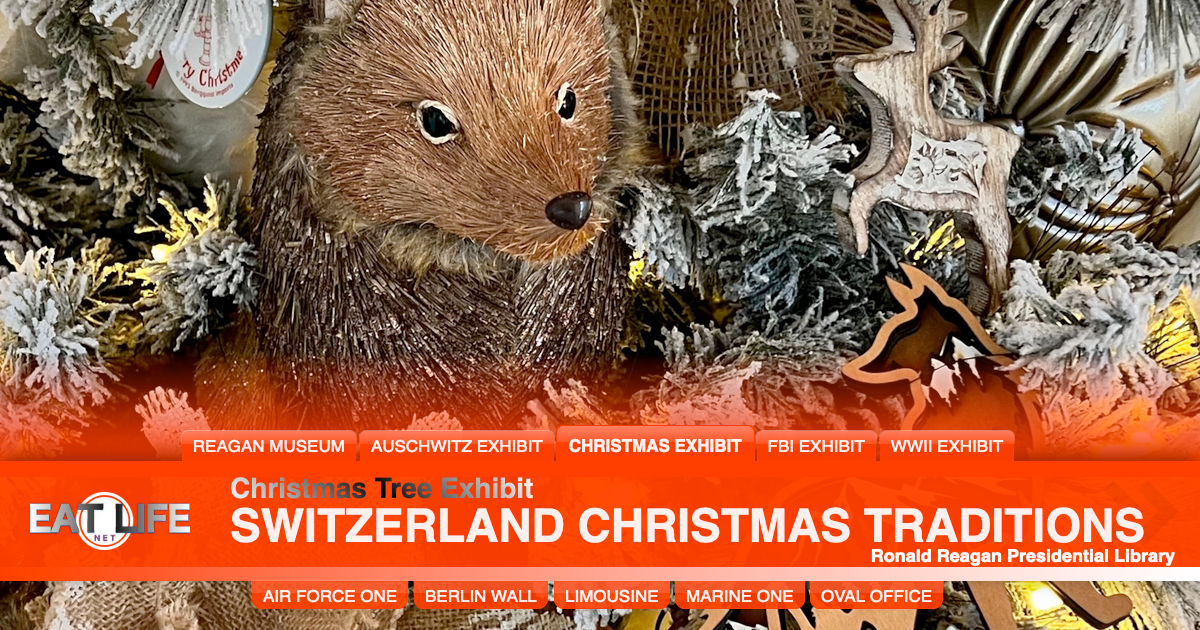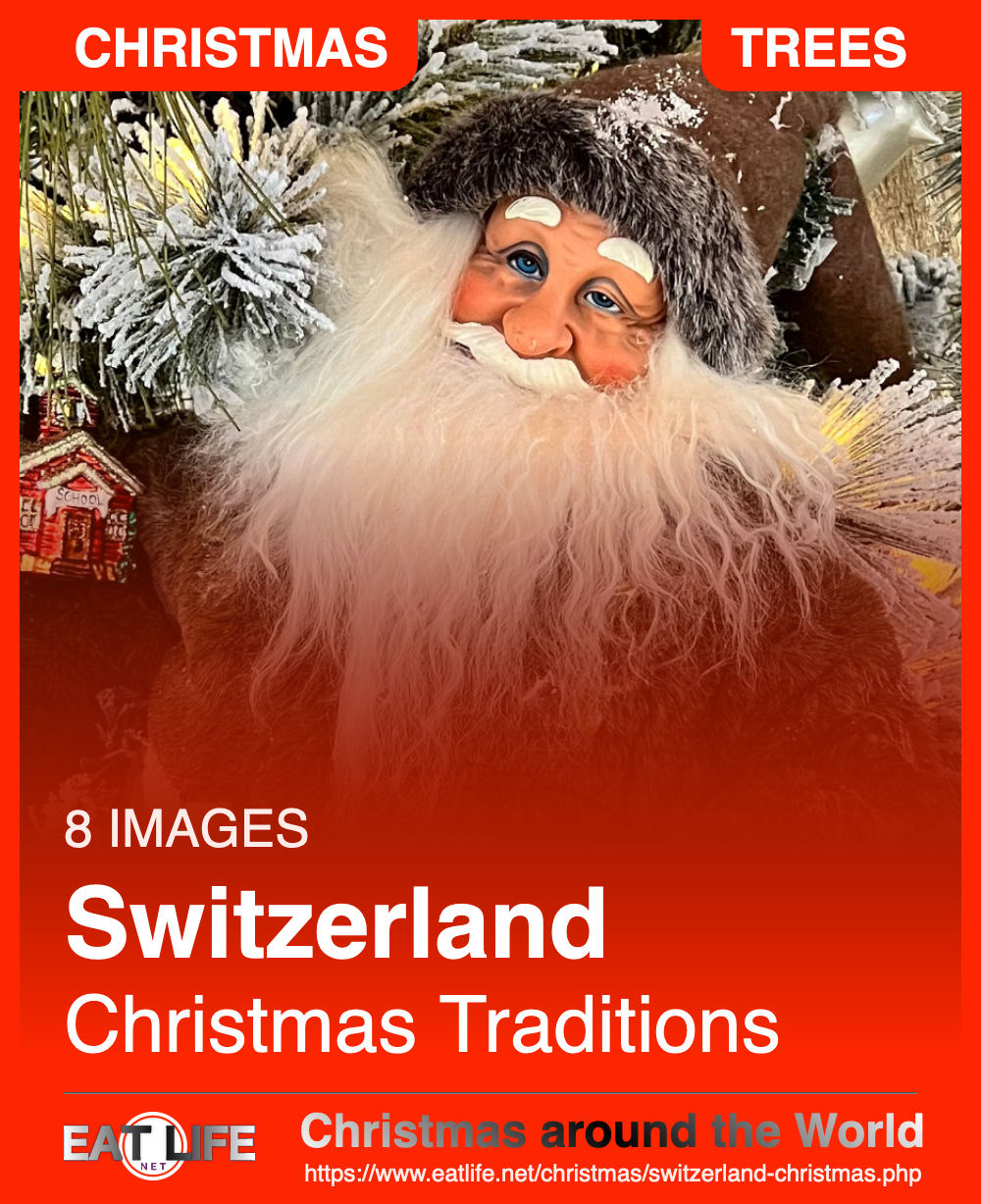CHRISTMAS:

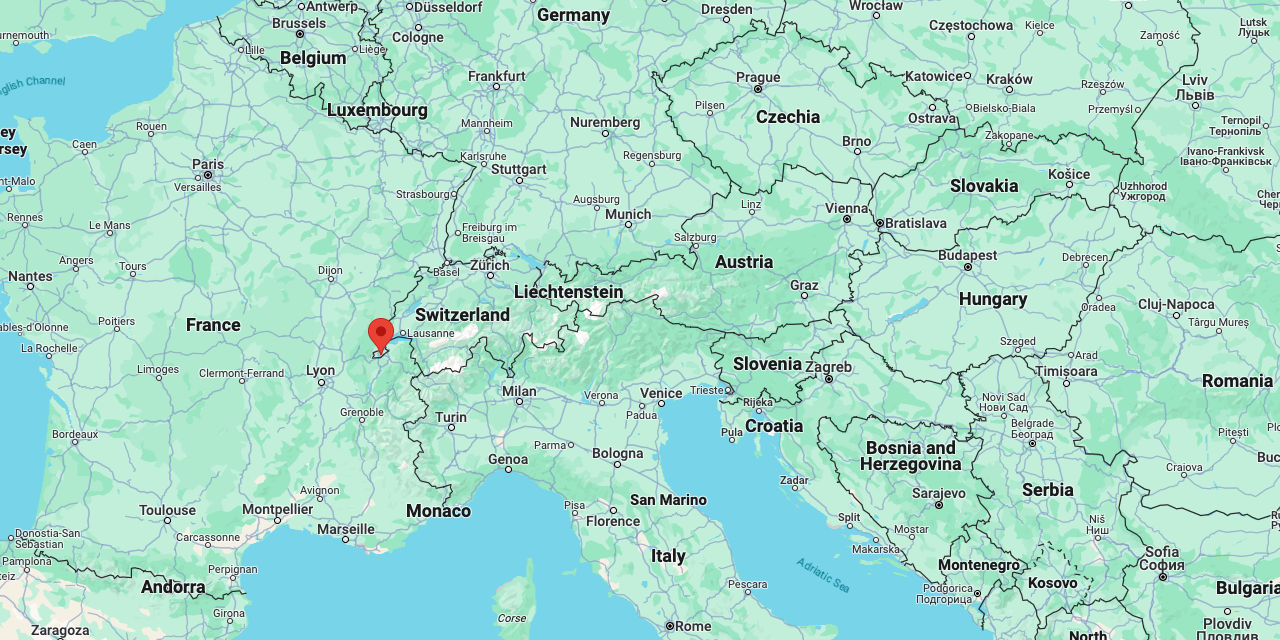
https://www.google.com/maps/place/Geneva,+Switzerland
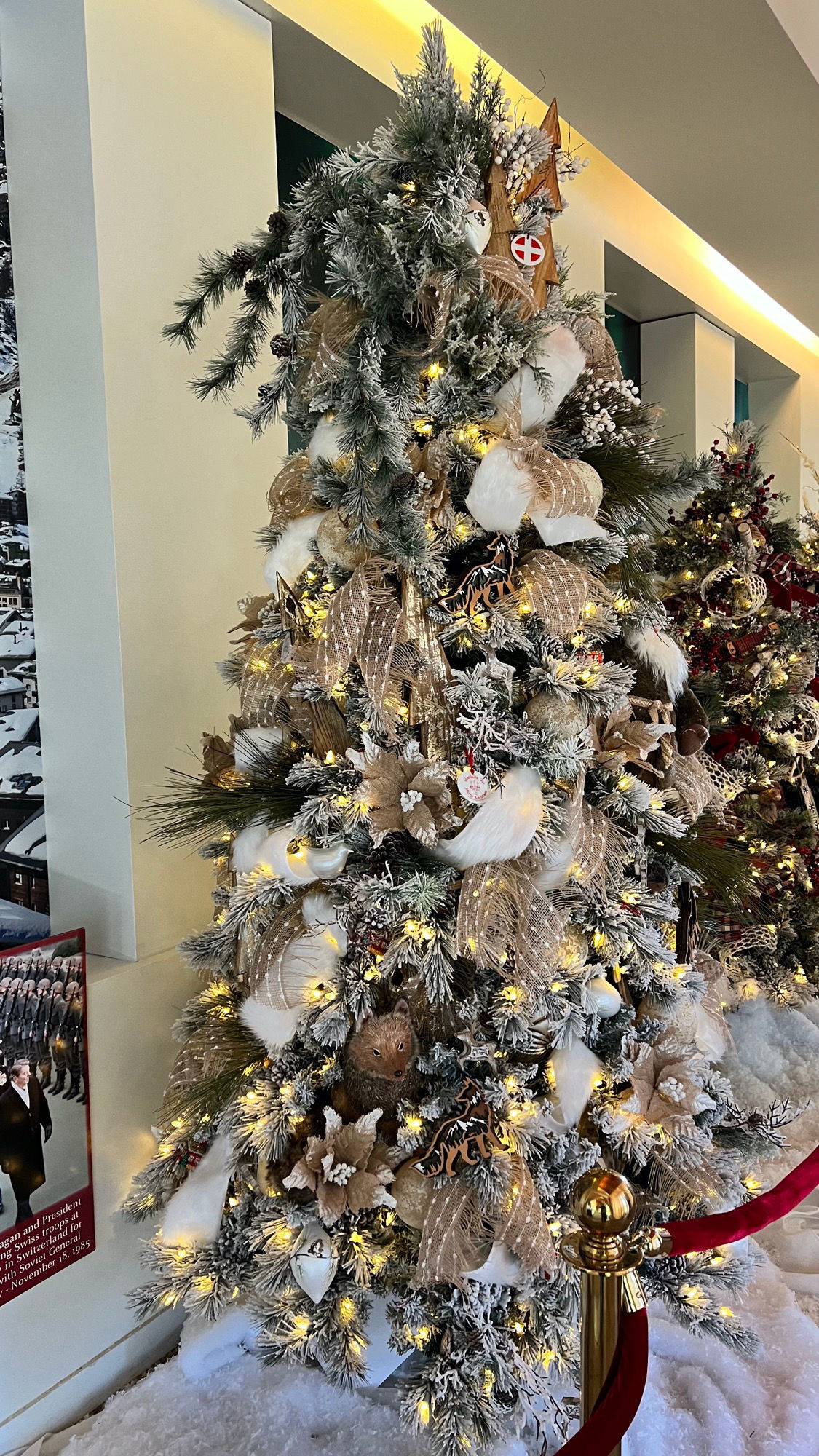
| HOW TO SAY MERRY CHRISTMAS: | |
|---|---|
| In French | Joyeux Noel |
| In German | Frohe Weihnachten |
| In Italian | Buon Natale |

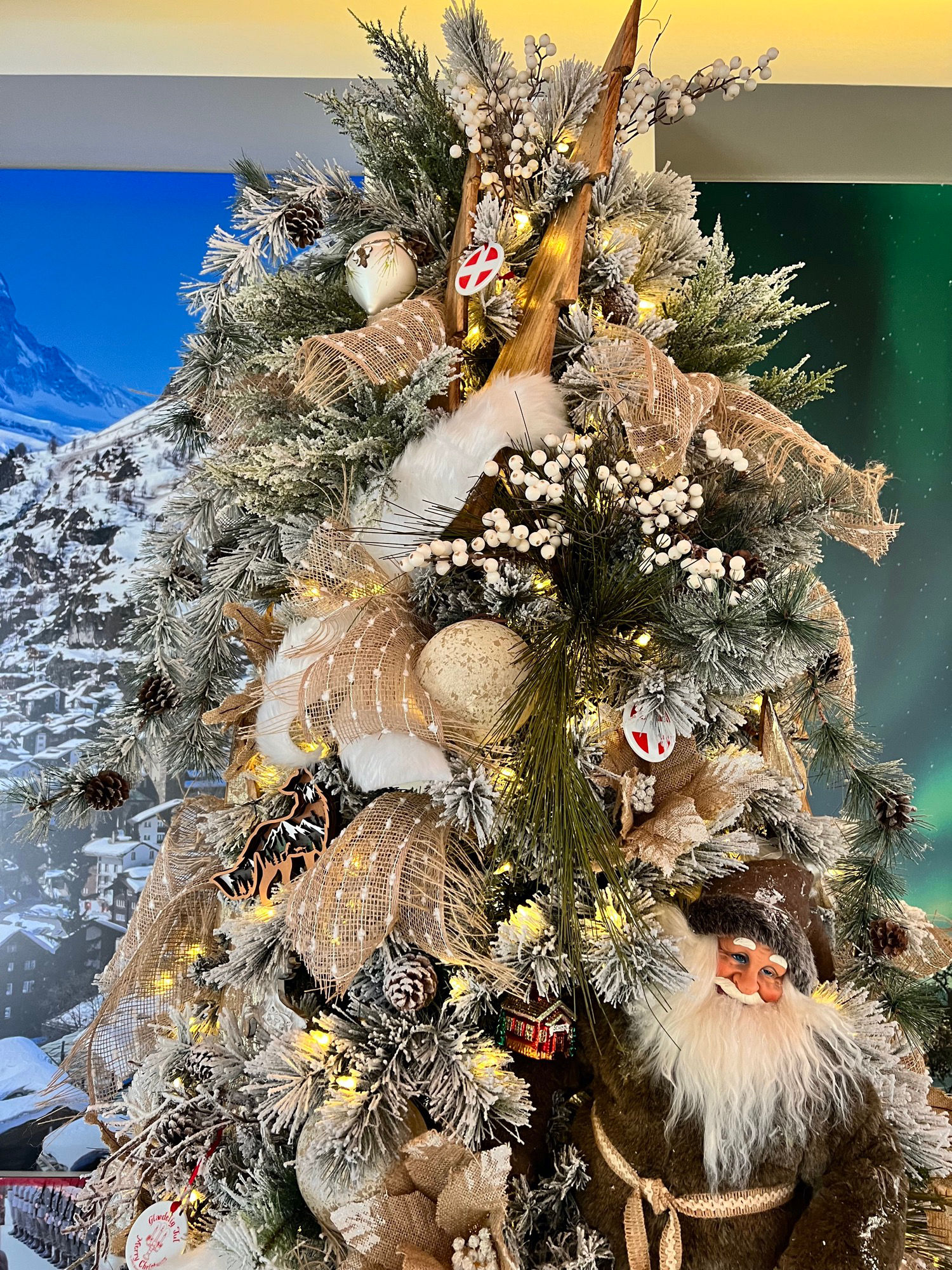
WHYCHRISTMAS.COMChristmas in Switzerland
Christmas in Switzerland shares many of the customs from its neighbors Germany and Austria. But it has many traditions of its own!Advent marks the start of the Christmas preparations. Advent calendars and crowns are both popular. In some villages, there are 'real' advent calendars with different houses decorating an 'Advent Window'. On the day when it's your house with the advent window, you hold a party for the villagers in the evening. There's food, mulled wine (called Gluhwein) and music.
Christmas markets are very popular in towns and cities where you can buy all kinds of Christmas foods and decorations. There are big light displays and you can enjoy some more hot Gluhwein!
There are many local traditions of parades and carol singing in Switzerland.
- In the Bernese Oberland region, there are processions starting on Christmas Day and finishing on New Year's Eve. They're known as the 'Trychle' as people parade wearing a big Trychler (cow bell) or carrying drums and normally wearing masks. They walk through the streets making lots of noise and are meant to scare the evil spirits away!
- The 'Urnasch Silvesterklause' processions take place in the Appenzell Ausserrhoden, especially in the villages around Urnasch. They take place from December 31st to January 13th and date back over 200 years. The people (known as Klause in the processions) wear costumes, masks and head dresses. They go from house to house singing and making lots of noise to wish people a good new year.
- Star Singing is also very popular among children. They go carol singing from the last week of Advent until Epiphany, carrying a large star infant of them. The star represents the star that the Wisemen followed when they visited the baby Jesus.
- In Switzerland St Nicholas is known as Samichlaus and he might visit you on 6th December. You might also be fortunate enough to have some presents from the baby Jesus (or Father Christmas) on the 25th and on Epiphany (6th January) you might be visited by the Befana (in South Switzerland) and/or the Three Kings (in the rest of Switzerland). That's a lot of present bringers!
- Christmas Trees are popular in Switzerland and are often bought and decorated on Christmas Eve. Some people like use real candles on the tree, which are traditionally lit on Christmas Eve (when the presents are being opened!) and on New Year's Eve (for good luck).
- The main Christmas meal is eaten on Christmas Eve and popular foods include a Christmas ham and scalloped potatoes with melted cheese and milk baked into it. Dessert is often a walnut cake and Christmas cookies.
- Cookies are very popular to buy and make. Each family has their own recipes and favorites.
- Another popular food, especially for parties, is fondue (a pot of melted cheese which you dip bread in - and you might have to kiss the person on your left!). Sometimes 'FIGUGEGL' (fee-goo-geck-ul) is added to party invitations. This means 'Fondu isch guet und git e gueti Lune' (fondue is good and gives a good mood).
MERRY CHRISTMASThere are four official languages in Switzerland
- Merry Christmas in Swiss German is Schoni Wiehnachte
- In French it's Joyeux Noel
- In Italian it's Buon Natale
- In Romansh it's Bellas festas da Nadal
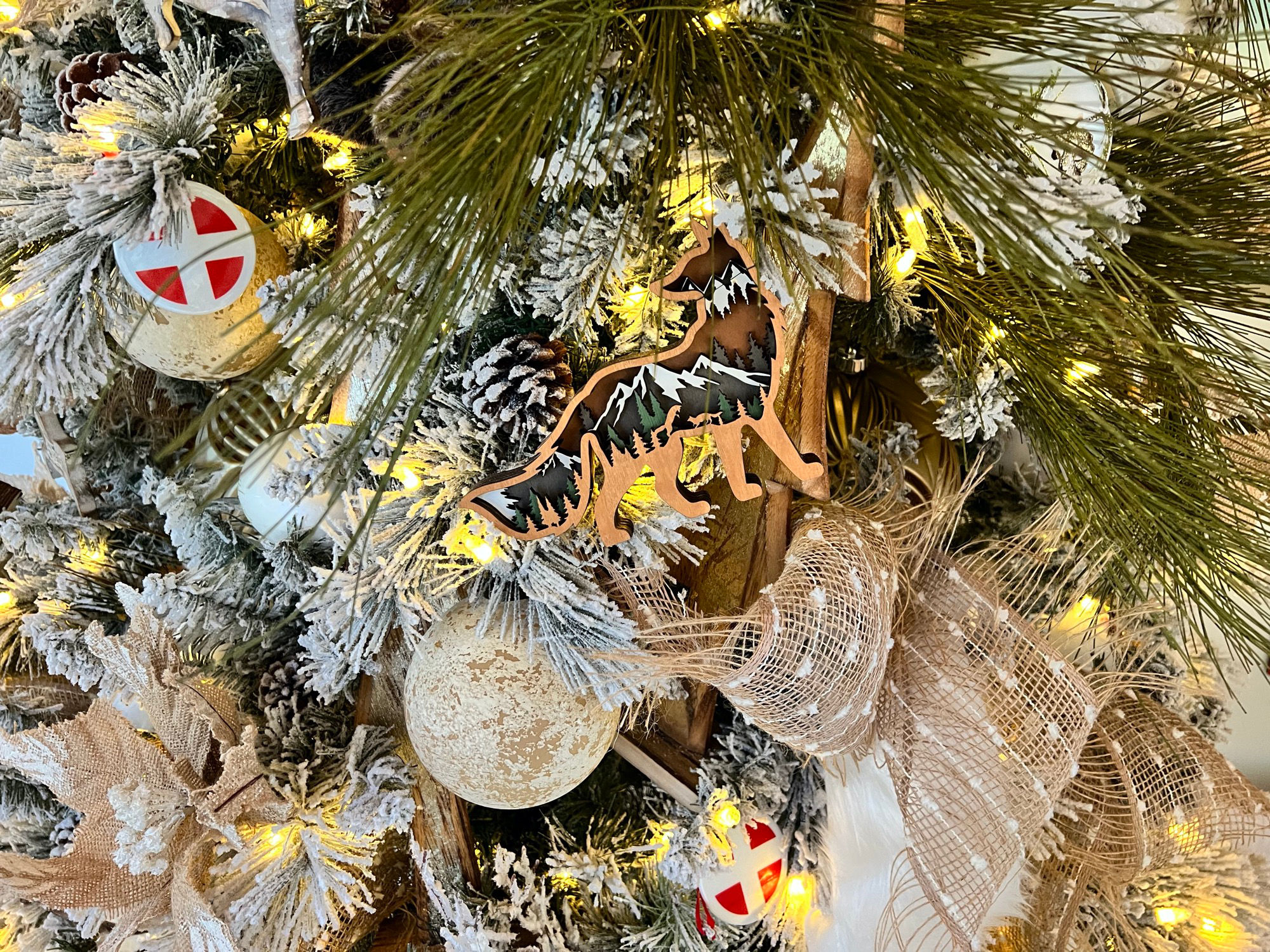
CULTURE TRIPSwitzerland Christmas Markets
When the winter season comes and the first snows of the season fall, Switzerland really shifts it up a notch, particularly when it comes to Christmas markets. One pops up in almost every town and city. To help you decide where to go we're showcasing the most magical of all of Switzerland's markets.Montreux
Open from November 23 to December 24
Arguably the most magical Christmas Market in Switzerland is held in the town of Montreux, near Lac Leman. With a huge number of stalls selling all kinds of Christmassy gifts and enough great food stalls to make you want to come back for seconds and thirds, the Montreux market has everything you'd want and more. On top of that, the setting couldn't be better with the huge expanse of Switzerland's largest lake in front of you and the glistening Alps surrounding you. Children will love the fairytale wonderland held within the walls of Chillon Castle, Switzerland's number one historic site, which is decked out in Christmas attire for the entire month of December.Zurich
Open from November 23 to December 24
The whole of Zurich, from the old town to the railway station embraces the Christmas spirit. Visit the Niederdorf district to wander through Zurich's oldest market where vendors hawk all manner of seasonal trinkets and antiques. Strolling along the famous Bahnhofstrasse, the city's premier shopping street, takes you to the Werdmuhleplatz market, where the highlight is a giant, singing tree that bursts into spontaneous song. If you're just passing through you can also take in some Christmas cheer at the railway station where a huge 50 ft tree sparkles with Swarovski crystals.Basel
Open from 23 November to 23 November
Basel's Munsterplatz is transformed into a winter forest that children will simply love. They can craft their own candles, guzzle down hot chocolate and decorate gingerbread and much more. Basel's Christmas market is known to be one of the prettiest in the whole of Switzerland. There are dozens of artisanal stalls split between the Munsterplatz and the Barfusserplatz, between which the streets are beautifully decorated.Bern
Open from 2 December to 23 December
Every year Switzerland's capital becomes an understated, yet beautiful winter wonderland. Its market is split between two central squares; the Munzterplatz and the Waisenhausplatz, each offering different goods. At the Waisenhausplatz the air is sweet with the scent of Swiss treats such as gluhwein, raclette and roasted chestnuts and you can pick up traditional crafts. Visit the Munzterplatz if you want to browse for a special and unique handcrafted gift at the artisanal market.St. Gallen
Open from 26 November to 24 December
St. Gallen doesn't need Christmas to give it charm, but an extra smattering of snow and glittering fairy lights over its medieval buildings undoubtedly makes it even more special. On top of this, St. Gallen boasts the largest Christmas tree in the entire country, which is lit with a remarkable 18,000 lights every year. There are plenty of stalls to buy local handicrafts and treats, including local beers and a traditional cheesy raclette dish.
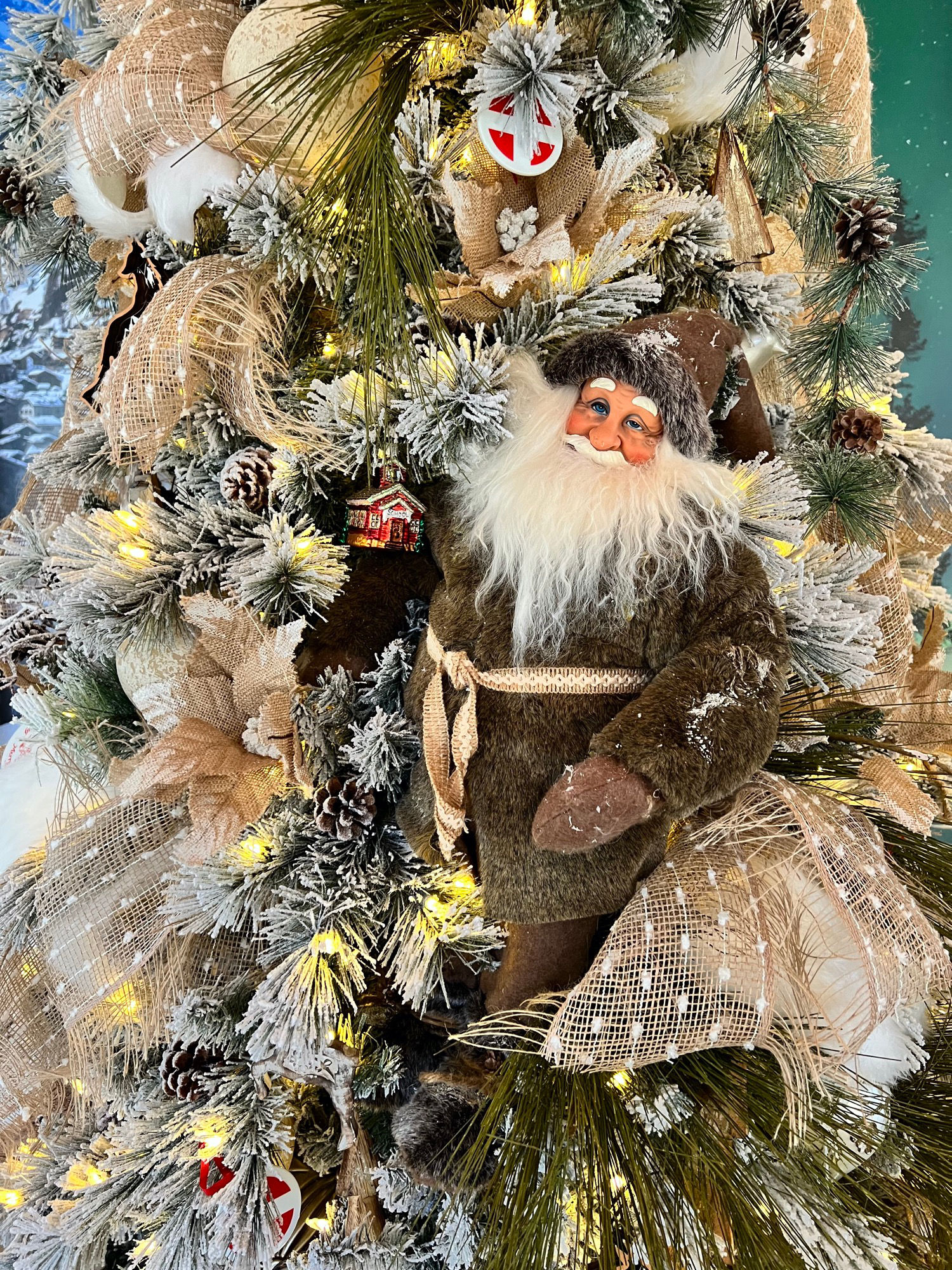
Reddit r/switzerlandAfter 4 years abroad I recently returned to Switzerland with my wife who I met abroad. Now I want to introduce her to all the neat Christmas traditions we have. There are a few I remember - but I probably miss many. Can you help me refresh my memory?Here are a few I remember (many I only know in Swiss German):
- gritibanz - little doe dudes one bakes for st. Nicolas day
- Advenzkranz - that's a ring made of pine-tree and decoration and 4 candles. One candle is lit every Sunday in December.
- Adventskalender where one opens a door on every day of December up until 24th - is there one that is particularly fun and won't make us too fat?
- Making candles (Kerzenziehen) - can I go there with her just the two of us or do we need to borrow some kid to go there?
- Christmas tree and decoration
- Mulled wine
- Christmas markets
- ...
- Heart_of_Glass
You can order the Samichlaus to come to your house.When I was a kid we used to do Adventsfenster where every house in the neighborhood would get assigned a date from 1-24.12. and decorate a window with their date. Many would stick colored paper on and get really creative. When it was "their" day they would somehow light the window so we could see it shine outside and all the neighbors would be invited to their house for apero riche.
I don't know whether this is a tradition anywhere else or whether I just grew up in a groovy neighborhood.
Of course you also have to bake cookies. Mailanderli, Zimtstern, Brunsli, Chrabeli, etc.
- Vordefiniert
- The Samichlaus and his Schmutzli, either ordered to your house or visited in the forest
- Going to some public event where a bunch of schools kids are forced to sing felice navidad
- Guetzle - Bake so many cookies you could drown in them
- Gifting the wine you were gifted the year before
- Looking at the light installations
- Going to a christmas market, drinking gluhwein
- Having a big christmas dinner with any family member that tolerates you
Not so traditional but maybe nice:
- Going ice skating on a skating field in the town center
- Going to Lenzerheide looking at the artsy light installations in the forest
- Going up some hill, to see some snow
- Go for a walk and gossip about your neighbours christmas decoration

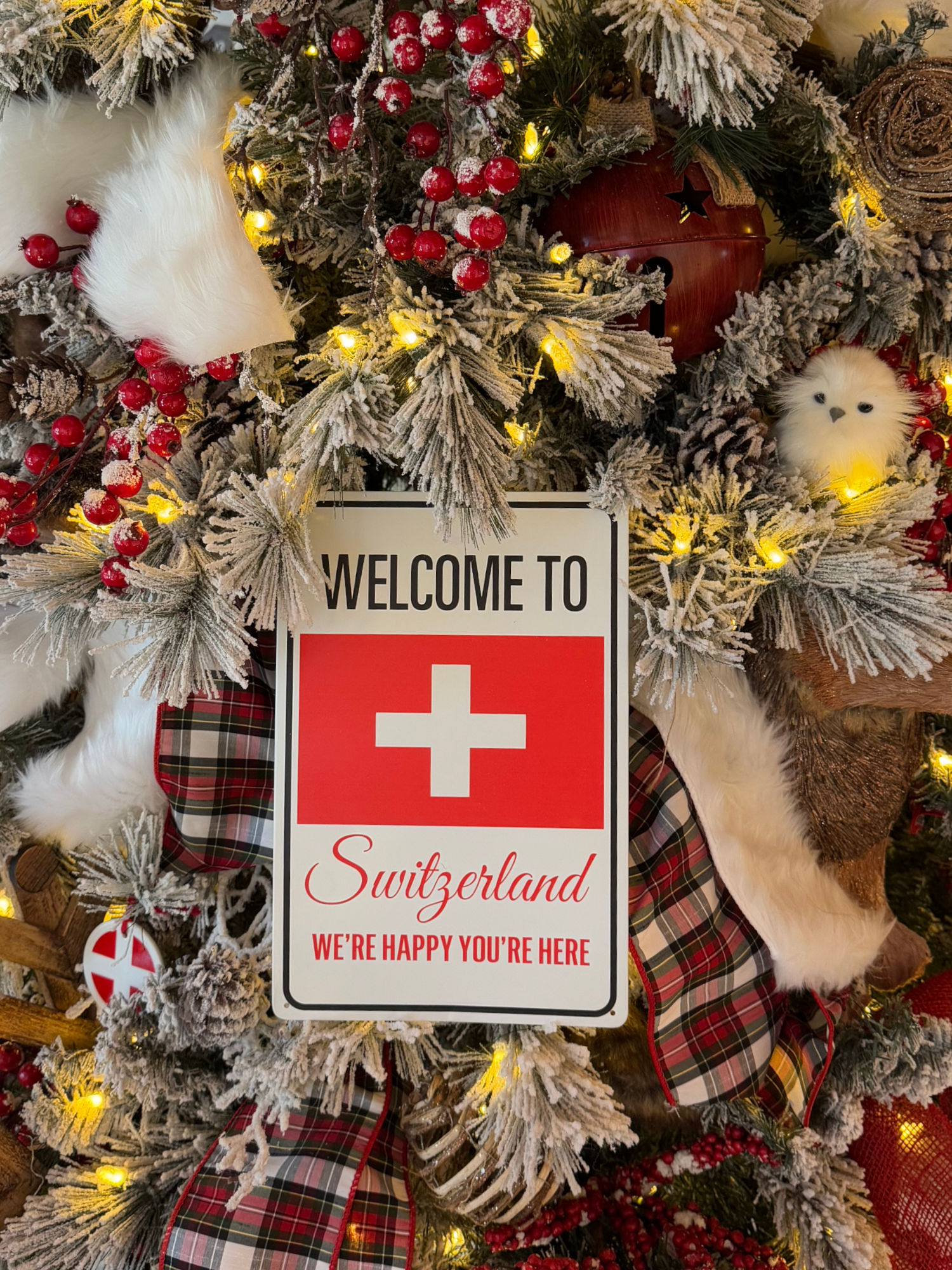

WORLD HOLIDAY TRADITIONSHoliday Traditions of Switzerland
Christmas celebrations in Switzerland do not differ very much from those in other western European nations and the United States. However, the customs in Switzerland's four different linguistic regions (German, French, and Italian) tend to resemble those of their immediate neighbors, Germany and Austria for the German-speaking part, France for the French-speaking cantons (states) and Italy for the canton of Ticino and southern valleys of the Grisons.There is an interesting difference in comparison with American customs: Santa Claus plays a much smaller part at Christmas. In the German and French-speaking parts of the country, his role is taken over by the "Christkind" or "Le petit Jesus," the Christ child, a beautiful, radiant, angel-like being with wings, dressed in white with a shining crown and a magic wand. According to popular belief, it represents little Jesus. Though sometimes, it is connected with an angel bearing a light or star who heralded the birth of Christ at Bethlehem. The Christ child also has the attributes of a fairy (wand and wings). Little children are told that this person -and not Santa Claus- brings the tree and the gifts on Christmas Eve. That is why small children do not get to see the tree before the actual celebration. Bigger children, however, help the parents decorate the tree. At the foot of the decorated tree, a creche is often placed with wooden or ceramic figures representing the adoration of Jesus in the manger at Bethlehem, with shepherds, angels, sheep, a cow and a donkey and the three Magi.
Usually parents decorate the tree on Christmas Eve. But more and more, especially young families are adopting the American way of having a decorated tree and electric lights all through December. (December is also "Advent" or "waiting" period: four candles on a green spruce wreath are the outward sign of this period, when a new candle is lit every Sunday until Christmas Eve. Advent is usually a hectic time with buying gifts, decorating tree and other ornaments, learning poems and songs, all contributing to the festivities of Christmas. After an early dinner, the whole family, ideally several generations, gathers around the tree. Songs and sometimes hymns are sung. Some read the birth passage from the bible. Gifts are exchanged. Those who are not too tired go to midnight mass which is always particularly festive. The most popular song heard during that time is "Silent Night, Holy Night," written and composed in Austria. The tree is always there on Christmas Eve. But depending on the region, Christmas gifts are exchanged on Christmas Day, January 1 or January 6 (Epiphany, when the three Magi were said to have visited the Christ child).
The name Santa Claus comes from Sankt Nikolaus or Saint Nicolas (an early Christian bishop from Myra in present-day Turkey, the protector of children). This friendly figure does not play a role at Christmas, but appears on December 6, the Patron Saint's Day. In the Swiss German part, he is known as "Samichlaus" and he visits homes and schools, distributing sweets, fruits and nuts to well-behaved children and giving good advice to the less well-behaved. In Switzerland, he is not accompanied by a reindeer, but very often by a donkey and a dark-clad assistant. The children assume that they come from the snowy mountains.

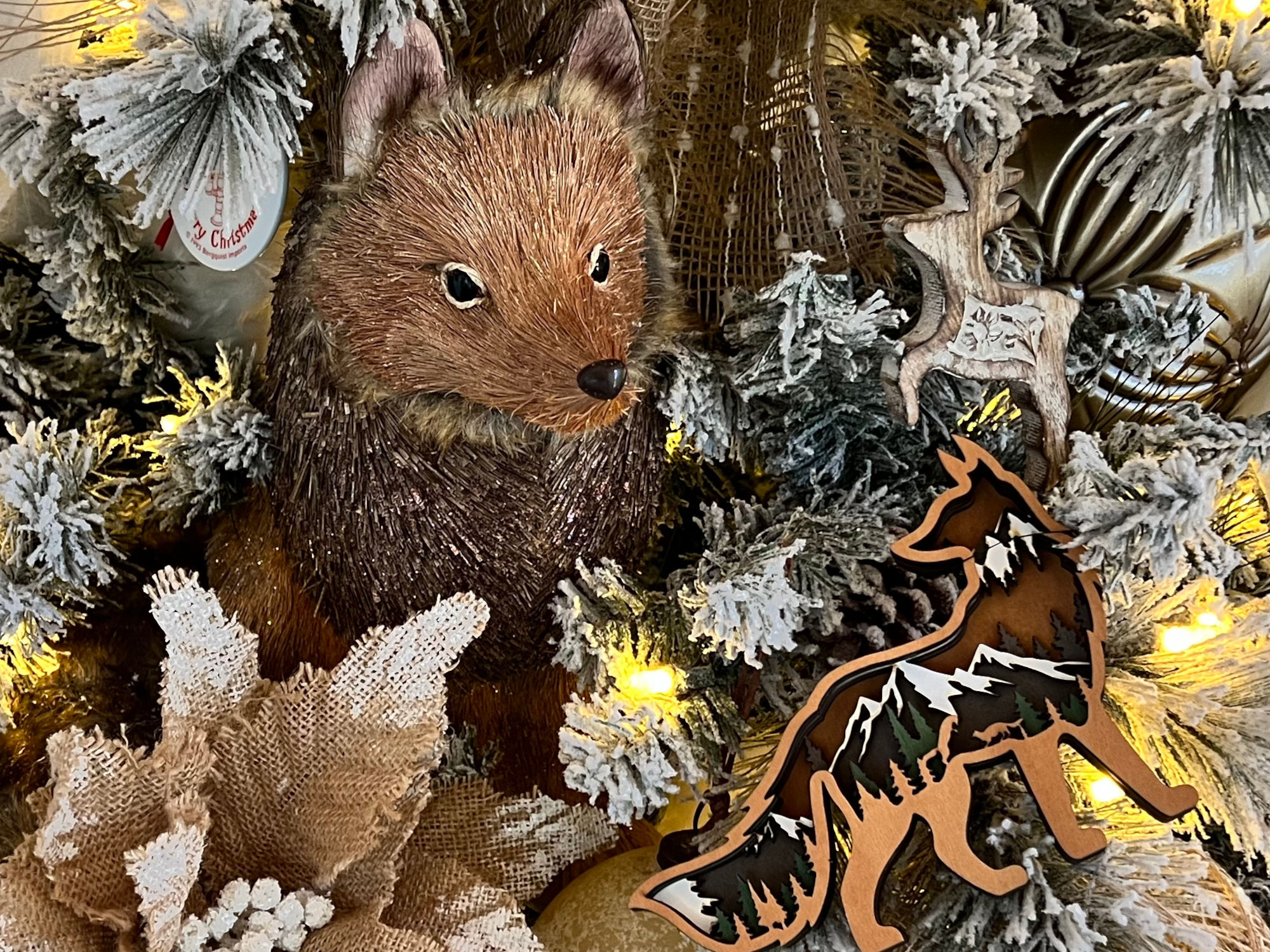
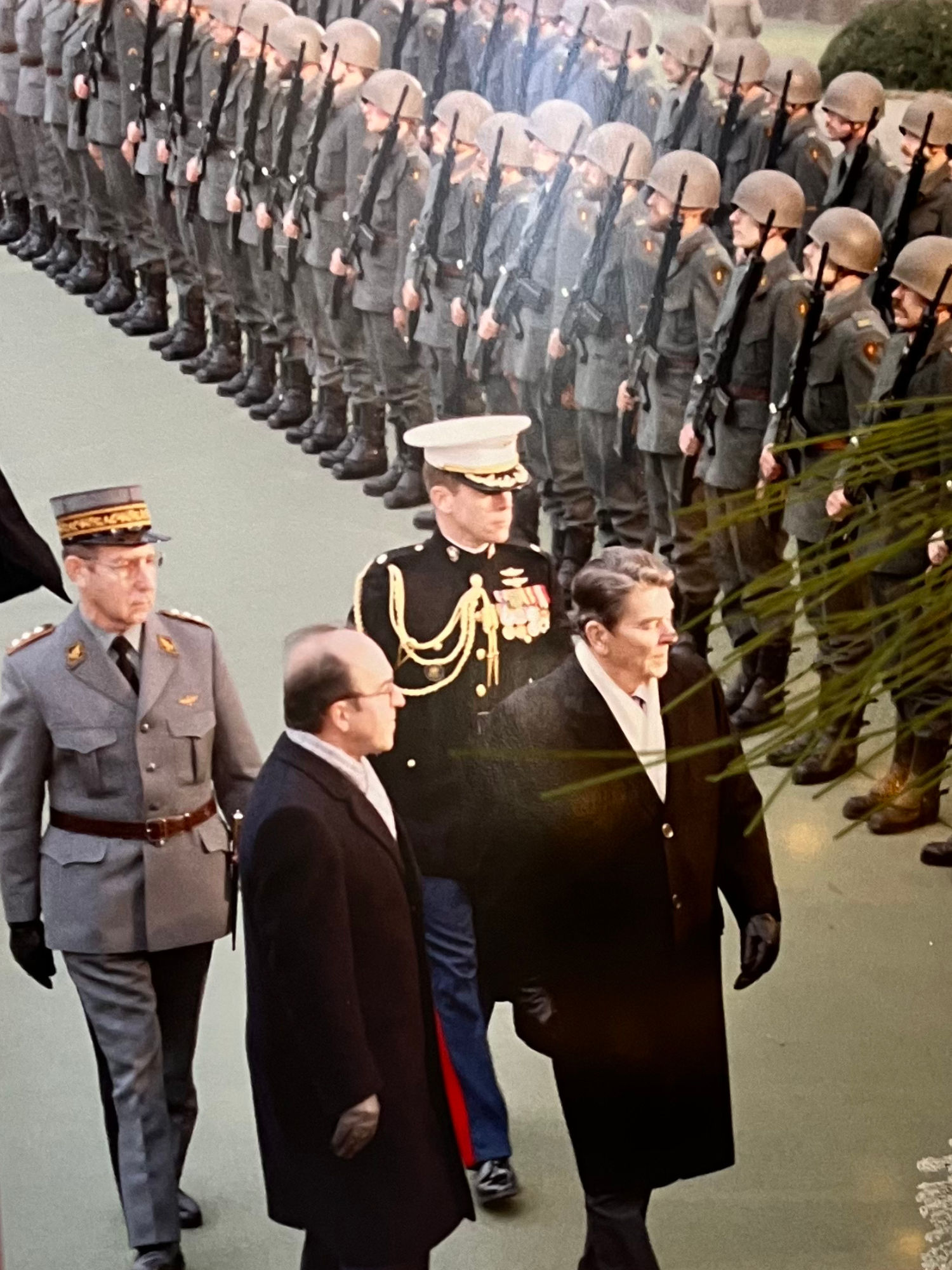
President Ronald Reagan and President Kurt Furgler reviewing Swiss troops at the arrival ceremony in Switzerland for a Summit Meeting with Soviet General Secretary Gorbachev.
Reagan's Daily DiaryMonday, November 18, 1985
Both of us had a wakeful night. The day was colder & darker. Don R. came for me at 10:55 then we walked across to the Pometta House for a meeting plus a working lunch-Lord I hope I’m ready & not overtrained. After lunch we picked up Nancy & went to Le Reposoir for welcome ceremony with Pres. Furgler. Usual Nat. Anthems & review of troops. Then a plenary meeting with him & his top people. We have a top relationship-very warm & friendly & few if any problems. They were happy with my position on S.D.I. & Protectionism. Back to our quarters & met the owners the Pometta family-very nice. They rent this house to the Aga’s son. Nancy surprised me with a masseur coming in at 5 P.M. I fell asleep about 4 x while he was massaging.Key Facts
- President Reagan meets with President of the Swiss Confederation Kurt Furgler to discuss the Strategic Defense Initiative.
RONALD REAGANRemarks on Arrival in Geneva, SwitzerlandNovember 16, 1985
President Furgler, I would like to extend to you and to the Swiss people my appreciation for helping to make possible the coming meetings between representatives of the United States and the Soviet Union. Nancy and I are delighted to be in this magnificent city on the shores of Lake Geneva. On behalf of the American people, thank you for your warm and friendly welcome.
Mr. President, it is fitting that the meetings of the next few days should take place on Swiss soil, for Switzerland has long been a leader in the search for peace and the defense of human freedom. Again and again, you've provided your territory for international meetings and your good offices in the mediation of disputes. It was the Swiss who founded one of the great humanitarian organizations of our time, the International Red Cross. And it is Switzerland that often represents the diplomatic interests of other nations, including the United States, in lands where these nations have no formal diplomatic relations of their own. Indeed, in your unshakable commitment to independence, democratic government, and human rights, the Swiss Confederation in itself serves as an example to all the world.
The motto on the Great Seal of the United States, Mr. President, is "E Pluribus Unum" -- Out of many, one. Well, here in Switzerland, a country of rich religious, cultural, and linguistic variety, you practice just such unity in diversity. Permit me to add that our two countries are bound together by family ties. As early as 1562 a Swiss citizen appeared in Florida, and in 1670 a Swiss settlement was established near Charleston, South Carolina. Ever since, Americans of Swiss descent have pioneered and led the development of our nation. Today Swiss Americans number in the hundreds of thousands, and I would be remiss if I failed to express their affection for you, their Swiss cousins. Indeed, just last month the good will of the American people toward the Swiss was formally expressed in a joint resolution of the Congress of the United States.
And recently, Mr. President, Boston University awarded you an honorary doctorate of laws. In your acceptance address, you stressed the obligations incumbent upon the West to defend its values and its way of life. "It is," you said, "part of the definition and vocation of the human being to be free." Well, Mr. President, each in its own way, our two nations stand at the forefront of this struggle for liberty; each stands determined to defend the freedoms of its own people and to advance the cause of freedom throughout the world; and each rests confident in the knowledge that freedom will endure and prevail.
It is to make certain that this great work on behalf of human freedom can go forward in peace that I have come here today. As I stated last month before the United Nations, I'm convinced that American-Soviet relations need a fresh start -- a genuine give-and-take on regional conflicts, on human rights, and on the reduction of arms. American and Soviet differences on these matters run deep. Mr. Gorbachev and I cannot surmount them in only 2 days, but I'm here in the fervent hope that on behalf of all the people of the world, we can at least make a start.
President Furgler, once again, to you and the people of Switzerland, our friendship and our deepest gratitude.
NOTEThe President spoke at 10:36 p.m. at Cointrin Airport. He was greeted by President Kurt Furgler of Switzerland.
WIKIPEDIAOfficially the Swiss Confederation
A landlocked country located at the confluence of Western, Central and Southern Europe. It is bordered by Italy to the south, France to the west, Germany to the north and Austria and Liechtenstein to the east. Switzerland is geographically divided among the Swiss Plateau, the Alps and the Jura; the Alps occupy the greater part of the territory, whereas most of the country's population of 9 million are concentrated on the plateau, which hosts the largest cities and economic centers, including Zurich, Geneva and Basel.Switzerland originates from the Old Swiss Confederacy established in the Late Middle Ages, following a series of military successes against Austria and Burgundy; the Federal Charter of 1291 is considered the country's founding document. Swiss independence from the Holy Roman Empire was formally recognized in the Peace of Westphalia in 1648. Switzerland has maintained a policy of armed neutrality since the 16th century and has not fought an international war since 1815. It joined the United Nations only in 2002 but pursues an active foreign policy that includes frequent involvement in peace building.
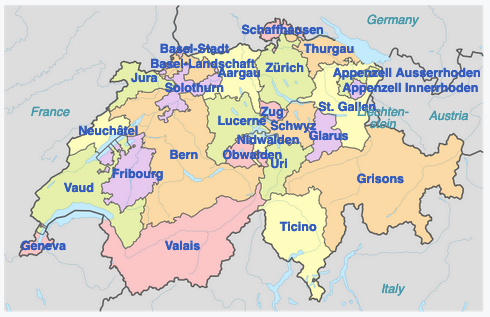
- The 26 cantons of Switzerland are the member states of the Swiss Confederation. The Swiss Federal Constitution declares the cantons to be sovereign to the extent that their sovereignty is not limited by federal law. Each canton has its own constitution, legislature, executive, police and courts. Similar to the Confederation, a directorial system of government is followed by the cantons. The two-letter abbreviations for Swiss cantons are widely used, e.g. on car license plates. They are also used in the ISO 3166-2 codes of Switzerland with the prefix "CH-" (Confœderatio Helvetica - Helvetian Confederation - Helvetia having been the ancient Roman name of the region). CH-SZ, for example, is used for the canton of Schwyz.
- Switzerland hosts the headquarters or offices of most major international institutions, including the WTO, the WHO, the ILO, FIFA, and the United Nations. It is a founding member of the European Free Trade Association (EFTA), but not part of the European Union (EU), the European Economic Area, or the eurozone; however, it participates in the European single market and the Schengen Area.
- Switzerland is a federal republic composed of 26 cantons, with federal authorities based in Bern.
- Switzerland is the birthplace of the Red Cross
- Switzerland is one of the world's most developed countries, with the highest nominal wealth per adult and the eighth-highest gross domestic product (GDP) per capita.
- Switzerland ranks first in the Human Development Index since 2021 and performs highly also on several international metrics, including economic competitiveness and democratic governance.
- Cities such as Zurich, Geneva and Basel rank among the highest in terms of quality of life, albeit with some of the highest costs of living.
- It has four main linguistic and cultural regions: German, French, Italian and Romansh. Although most Swiss are German-speaking, national identity is fairly cohesive, being rooted in a common historical background, shared values such as federalism and direct democracy, and Alpine symbolism. Swiss identity transcends language, ethnicity, and religion, leading to Switzerland being described as a Willensnation ("nation of volition") rather than a nation state. Due to its linguistic diversity, Switzerland is known by multiple native names: Schweiz (German); Suisse (French); Svizzera (Italian); and Svizra (Romansh). On coins and stamps, the Latin name, Confoederatio Helvetica-frequently shortened to "Helvetia"-is used instead of the spoken languages.
- The oldest traces of hominid existence in Switzerland date to about 150,000 years ago. The oldest known farming settlements in Switzerland, which were found at Gachlingen, date to around 5300 BC.
- In 1850 the Swiss franc became the Swiss single currency, complemented by the WIR franc in 1934.
- Switzerland was not invaded during either of the world wars.
- Extending across the north and south side of the Alps in west-central Europe, Switzerland encompasses diverse landscapes and climates across its 15,940 sq miles. Forty-eight mountains are 13,000 feett or higher in height. At 15,203 feet, Monte Rosa is the highest, although the Matterhorn 14,692 feet is the best known.
- The Swiss climate is generally temperate, but can vary greatly across localities, from glacial conditions on the mountaintops to the near-Mediterranean climate at Switzerland's southern tip. Some valley areas in the southern part of Switzerland offer cold-hardy palm trees. Summers tend to be warm and humid at times with periodic rainfall, ideal for pastures/grazing. The less humid winters in the mountains may see weeks-long intervals of stable conditions. At the same time, the lower lands tend to suffer from inversion during such periods, hiding the sun.
- Switzerland contains two terrestrial ecoregions: Western European broadleaf forests and Alps conifer and mixed forests.
- Switzerland has a dense network of complementary large, medium and small towns. About 85% of the population live in urban areas.
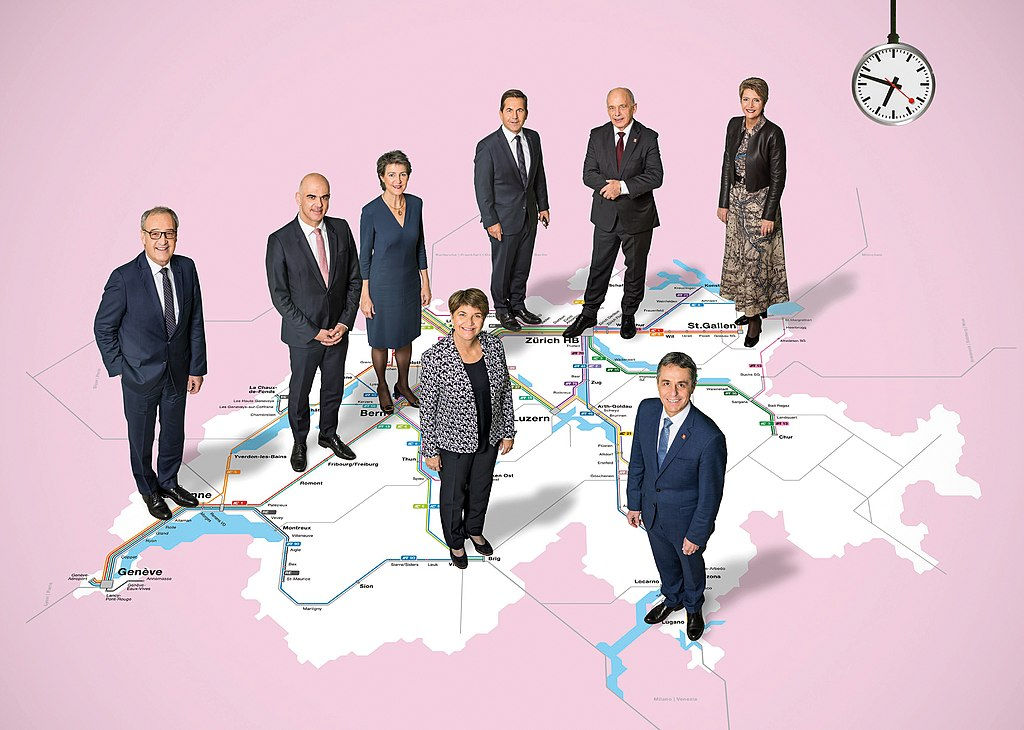
- The Federal Council directs the federal government, the federal administration, and serves as a collective head of state. It is a collegial body of seven members, elected for a four-year term by the Federal Assembly, which also oversees the council. The President of the Confederation is elected by the Assembly from among the seven members, traditionally in rotation and for a one-year term; the President chairs the government and executes representative functions. The president is a primus inter pares with no additional powers and remains the head of a department within the administration.
- Switzerland has a stable, prosperous and high-tech economy. It is the world's wealthiest country per capita in multiple rankings. The country ranks as one of the least corrupt countries in the world, while its banking sector is rated as "one of the most corrupt in the world". It has the world's twentieth largest economy by nominal GDP and the thirty-eighth largest by purchasing power parity. For much of the 20th century, Switzerland was the wealthiest country in Europe by a considerable margin (per capita GDP).
- As of 2021, it is the thirteenth largest exporter, and the fifth largest per capita. Zurich and Geneva are regarded as global cities, ranked as Alpha and Beta respectively. Basel is the capital of Switzerland's pharmaceutical industry, hosting Novartis, Roche, and many other players. It is one of the world's most important centers for the life sciences industry.
- Switzerland is home to several large multinational corporations. The largest by revenue are Glencore, Gunvor, Nestle, Mediterranean Shipping Company, Novartis, Hoffmann-La Roche, ABB, Mercuria Energy Group and Adecco. Also, notable are UBS AG, Zurich Financial Services, Richemont, Credit Suisse, Barry Callebaut, Swiss Re, Rolex, Tetra Pak, The Swatch Group and Swiss International Air Lines.
- Switzerland is a tax haven. The private sector economy dominates. It features low tax rates; tax revenue to GDP ratio is one of the smallest of developed countries.
- Switzerland has birthed many Nobel Prize laureates. They include Albert Einstein, who developed his special relativity in Bern. The Nobel Peace Prize has been awarded nine times to organizations headquartered in Switzerland. Geneva and the nearby French department of Ain co-host the world's largest laboratory, CERN, dedicated to particle physics research. Notable inventions include lysergic acid diethylamide (LSD), diazepam (Valium), the scanning tunneling microscope (Nobel prize) and Velcro.
- The population is about 9 million (2023). Like most of Europe, Switzerland faces an ageing population, with a fertility rate close to replacement level. Switzerland has one of the world's oldest populations, with an average age of 42.5 years. Ethnic groups in Switzerland are as follows: Swiss 69.2%, German 4.2%, Italian 3.2%, Portuguese 2.5%, French 2.1%, Kosovan 1.1%, Turkish 1%, other 16.7% (2020 est).
- In 2016, the languages most spoken were Swiss German (59.4%), French (23.5%), Standard German (10.6%), and Italian (8.5%). Other languages spoken at home included English (5.0%), Portuguese (3.8%), Albanian (3.0%), Spanish (2.6%) and Serbian and Croatian (2.5%).
- Christianity is the predominant religion according to national surveys of Swiss Federal Statistical Office (about 67% of resident population in 2016–2018 and 75% of Swiss citizens).
- Skiing, snowboarding and mountaineering are among the most popular sports, reflecting the nature of the country Winter sports are practised by natives and visitors. The bobsleigh was invented in St. Moritz. The most prominently watched sports in Switzerland are football, ice hockey, Alpine skiing, Schwingen, and tennis. Swiss tennis player Roger Federer is widely regarded as among the sport's greatest players. Traditional sports include Swiss wrestling or Schwingen, a tradition from the rural central cantons and considered the national sport by some.
- Traditional Swiss cuisine uses ingredients similar to those in other European countries, as well as unique dairy products and cheeses such as Gruyere or Emmental, produced in the valleys of Gruyeres and Emmental. The number of fine-dining establishments is high, particularly in western Switzerland.
- The Swiss are the world's largest chocolate consumers. Chocolate has been made in Switzerland since the 18th century. Its reputation grew at the end of the 19th century with the invention of modern techniques such as conching and tempering, which enabled higher quality. Another breakthrough was the invention of solid milk chocolate in 1875 by Daniel Peter.
- The most popular alcoholic drink is wine. Switzerland is notable for its variety of grape varieties, reflecting the large variations in terroirs. Swiss wine is produced mainly in Valais, Vaud (Lavaux), Geneva and Ticino, with a small majority of white wines. Vineyards have been cultivated in Switzerland since the Roman era, even though traces of a more ancient origin can be found. The most widespread varieties are the Chasselas (called Fendant in Valais) and Pinot Noir. Merlot is the main variety produced in Ticino.
EtymologyThe English name Switzerland is a combination of Switzer and land. Switzer was a term for a Swiss person in use during the 16th to 19th centuries. The name Switzer is from the Alemannic Schwiizer, in origin an inhabitant of Schwyz and its associated territory, one of the Waldstatte cantons which formed the nucleus of the Old Swiss Confederacy. The Swiss began to adopt the name for themselves after the Swabian War of 1499, used alongside the term for "Confederates", Eidgenossen (literally: comrades by oath), used since the 14th century.The data code for Switzerland, CH, is derived from Latin Confoederatio Helvetica (English: Helvetic Confederation).


